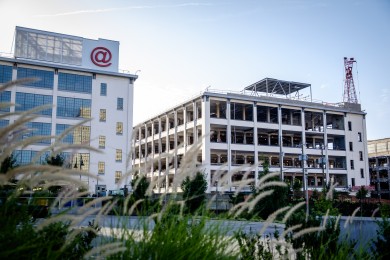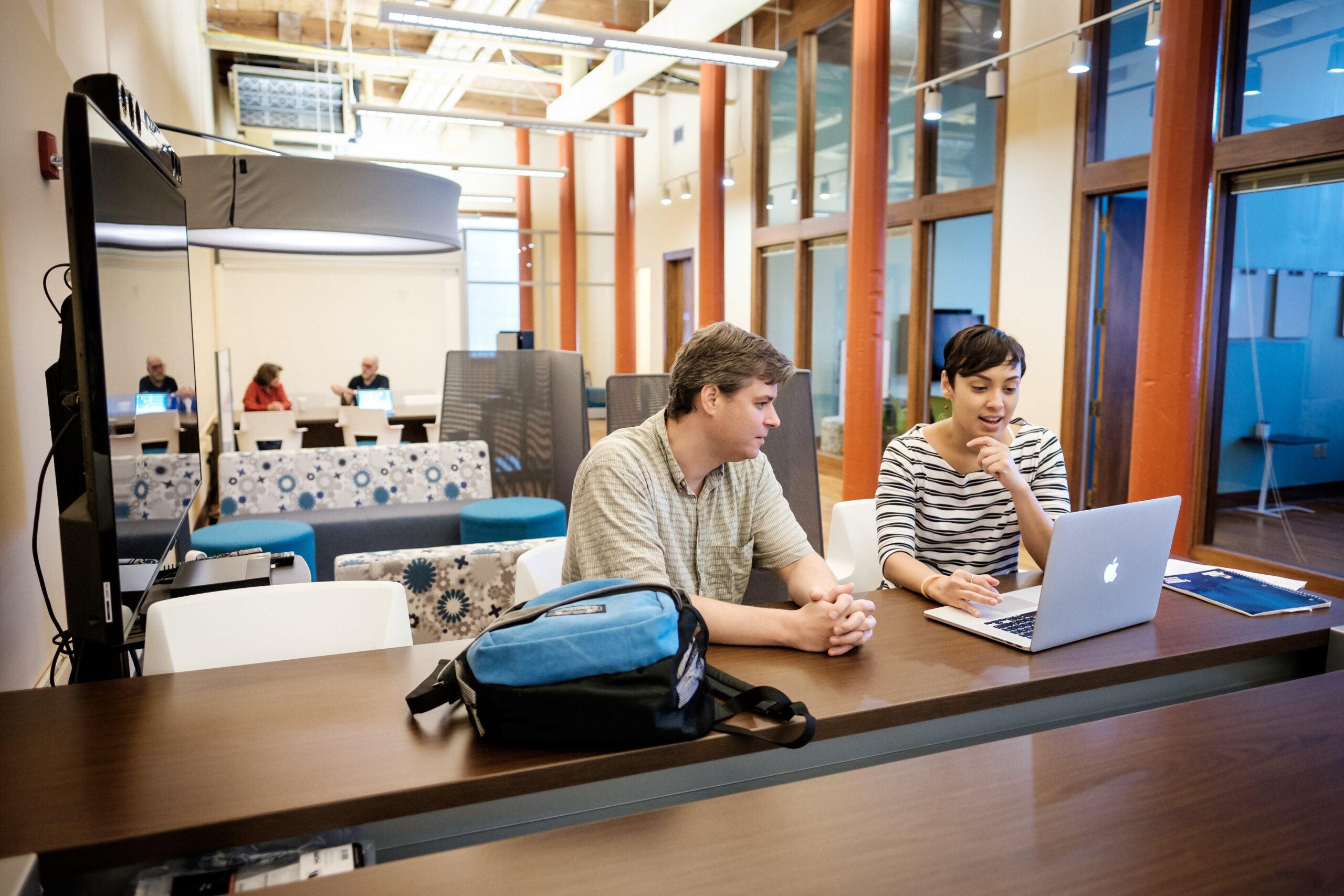New moves transcend boundaries
Location, location, location.
From the Brookstown area to Innovation Quarter, Wake Forest University is making a series of moves that aim to expand the University’s engagement with the surrounding community in addition to its geographic footprint.
With several graduate programs, undergraduate science classes and interdisciplinary centers inhabiting an increasing number of rehabilitated spaces outside the main entrances of the Reynolda Campus, Wake Forest is making community involvement and continual innovation easier and more accessible.
“By transforming historic real estate into modern educational facilities ideal for academic programs and community gathering spaces alike, Wake Forest is transcending the traditional boundaries of the Reynolda Campus in ways that invite the community in,” said Provost Rogan Kersh. “Wake Forest is committed to stronger, more meaningful connections among academics, arts, innovation and community engagement in Winston-Salem, our shared City of Arts and Innovation.”
Graduate School @ Brookstown
Last fall, the Graduate School of Arts and Sciences established a striking new downtown presence, the Graduate School @ Brookstown, in the historic Brookstown Mill (200 Brookstown Ave.). The 14,000 square-foot third floor of the building is now home to Masters of Arts programs in Documentary Film (DFP), Interpreting and Translation Studies, and Liberal Studies, as well as Lifelong Learning programs. The facility will also be home to a new emphasis in Sports Storytelling, launching this fall from the DFP.
Twenty-foot tall ceilings, exposed brick walls, and hardwood floors from the 1830s give the space historic charm that appeals to students of the arts, humanities and sciences alike. Technological advantages include a state-of-the-art production studio and more editing bays. Lightweight, brightly-colored furniture in the classrooms and open work stations in the common areas promote collaboration among classmates and colleagues.
Bradley Jones, Dean of the Graduate School of Arts and Sciences, said the combination of these features will translate into a recruiting advantage for prospective students, especially those in creative fields.
“Being within walking distance of Winston-Salem’s vibrant arts district is especially appealing to our documentary film students, who are already collaborating with the Milton Rhodes Center, New Winston Museum, and the RiverRun Film Festival,” said Jones. “The graduate school imagines the space as an inviting destination where Wake Forest students, faculty and staff can connect with members of the greater community through scholarship, partnership and events.”
Master of Fine Arts student Scott Schimmel agrees. “The new space really fosters collaboration, not just among students, but with faculty and the community at large as well.”
Former Davis House has a front porch for “Pro Humanitate”
Wake Forest University’s Pro Humanitate Institute and the Anna Julia Cooper Center rang in the New Year in a new location that makes civic engagement and collaborating with community partners easier for everyone involved.
This month, both entities found a new home in the historic Davis House (2599 Reynolda Road, at the corner of Polo Road; across from Wake Forest’s Human Resources office on Reynolda Road), which offers a welcoming space for community partners benefitting from civic engagement and social justice initiatives involving Wake Forest students, faculty and staff.
The Pro Humanitate Institute combines learning, teaching, research, service, and action; provides meaningful programming that encourages academic scholarship; fosters civic engagement; and addresses community-identified needs. The Anna Julia Cooper Center advances justice through intersectional scholarship.
The historic 6,000 square-foot home once belonged to Egbert L. Davis (JD 1904), a prominent Winston-Salem businessman and University trustee who helped bring about Wake Forest’s move to Winston-Salem in 1956 and for whom Davis Residence Hall on the Reynolda Campus is named.
Melissa Harris-Perry, founding director of the Anna Julia Cooper Center and executive director of the Pro Humanitate Institute, says the new location will serve as a bridge between the University and many of the people it serves.
“The missions of the Pro Humanitate Institute and Anna Julia Cooper Center extend far beyond the Reynolda Campus. This move allows Wake Forest students, faculty and staff to more seamlessly engage off campus while simultaneously inviting our community in,” said Melissa Harris-Perry. “We look forward to offering plenty of meeting and event space, parking for guests and access to main thoroughfares – benefits that make it easier and quicker for visiting community partners to meet, especially during regular business hours when parking on campus is more limited.”
Community partners agree. Last summer, Wake Forest opened the doors of the property’s 1,450 square-foot carriage house to a local branch of the Durham-based Diaper Bank of North Carolina. A proposal written by a Wake Forest student interning for the Anna Julia Cooper Center provided funding for a full-time staff person in the Triad.
“Partnering with Wake Forest University, The Pro Humanitate Institute, and the Anna Julia Cooper Center has been an important extension for Diaper Bank of North Carolina’s ability to serve local families. This relationship will form a bridge between our work in Forsyth County and the University community, bringing the two together for positive community-based change,” Michelle Old, Executive Director of the Diaper Bank of North Carolina.
In addition to its new location, the Pro Humanitate Institute will continue to maintain an office and staff presence in Benson University Center for programming and events that take place on campus, such as Volunteer Service Corps, Project Pumpkin, Hit the Bricks, and Wake ‘N Shake.
Undergraduate classes planned for Wake Forest Innovation Quarter

Wake Forest Innovation Quarter
In September 2015, the University confirmed plans to offer undergraduate academic programs in Wake Forest Innovation Quarter, a nationally recognized burgeoning hub of innovation in biomedical science and information technology.
Wake Forest has leased space in a former R.J. Reynolds Tobacco Company building from Wexford Science and Technology. Wexford is currently renovating space in the 60 series building, adjacent to the planned home of the Wake Forest School of Medicine, to accommodate classrooms and laboratories for innovative undergraduate science programs.
“Our interest in Wake Forest Innovation Quarter allows us to explore fully the intersection of arts and science, scholarship and entrepreneurship, and tradition and innovation,” said Wake Forest President Nathan O. Hatch. “An undergraduate presence in Wake Forest Innovation Quarter would add to the growing synergy among the city’s academic institutions, while supporting intellectual collaboration, research opportunities and community engagement.”
Wake Forest undergraduate students could begin taking classes and conducting research in Innovation Quarter as early as January 2017. Space is being planned to accommodate up to 350 students by 2021.
Categories: Community Impact, Experiential Learning, Pro Humanitate, Research & Discovery, University Announcements
Media Contact
Wake Forest News
media@wfu.edu
336.758.5237




